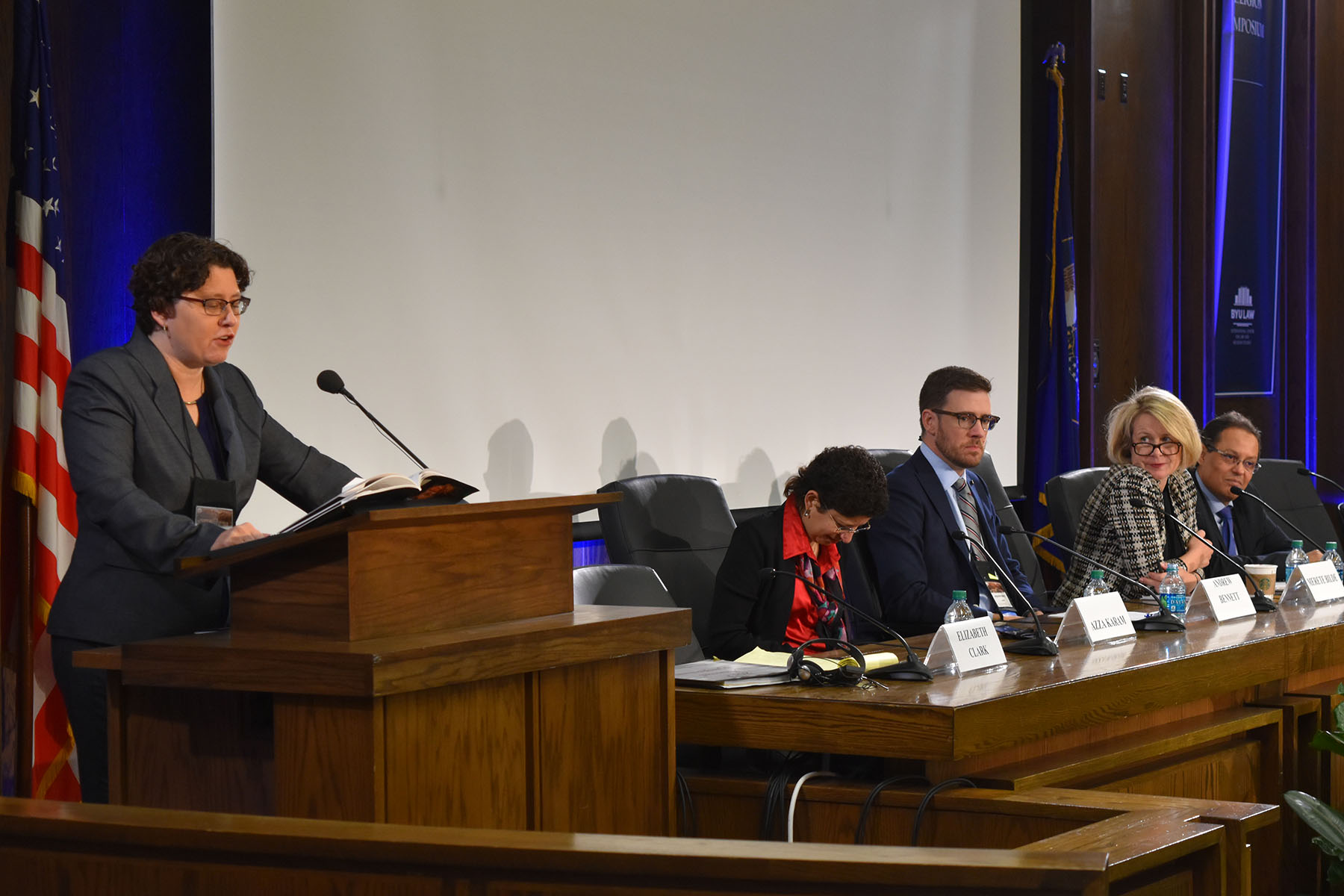Symposium 2017: First Plenary: Religion and Security in a Changing World

by Alexander Alton, BYU Law Student and Symposium Volunteer
The first plenary session, held Monday October 2, 2017 and moderated by Professor Elizabeth Clark, focused on religion and security in a changing world. The session included four speakers: Azza Karam, Senior Advisor on Culture at the United Nations Population Fund and Coordinator of the U.N. Inter-Agency Task Force on Religion and Development; Andrew Bennett, Senior Fellow and Chair in the Cabinet of Canadians and former Ambassador of Religious Freedom for Canada; Merete Bilde, Policy Advisor for the European External Action Service in European Union; and Khalid Hajji, Secretary General of the European Council of Moroccan Ulema.
Professor Clark opened the session by observing a moment of silence for the victims of the Las Vegas attack on October 1, 2017. Ms. Karam then spoke about her work with the United Nations Inter-Agency Task Force on Religion. The task force was formed in 2007 following a General Assembly Resolution to establish a Tripartite Forum (Governments, UN entities, Civil Society) to discuss how to move forward with human rights issues, including religious freedom. The task force works with twenty of the sixty-five U.N. entities and provides skills training on how to interact with faith based partners. It also serves as a great starting place for faith based organizations (FBOs) to know where to start when trying to engage with the United Nations. Ms. Karam explained that it is important for the U.N. to engage FBOs and other faith based actors because more than 80% of the world’s population identifies with a religious group. Religious actors are great social service providers, and they are almost always the first responders to humanitarian crises. Additionally, Religious actors are part of the political fabric at national, regional, and international levels. Ms. Karam finished her speech by sharing some of the ways in which the task force engages with faith based actors, and some of the lessons learned from the last decade of cooperation between the U.N. and FBOs.
Professor Andrew Bennett focused on the impact of an increasingly closed, secular society— that which seeks to exclude religious belief from the public square. He outlined some of the pitfalls of closed secularism, including the fact that a closed secularist mindset limits the ability of foreign policy actors to speak publicly about religion and makes it more challenging for religious groups to promote policy goals. Professor Bennett lamented that foreign policy actors often exhibit a willful disregard, even indifference, for profundity of religious beliefs worldwide. He also outlined six characteristics that reflect this indifference and ignorance, namely (1) the inability among foreign policy actors to speak publicly about religion; (2) the inability among foreign policy actors to speak in meaningful and informed ways with faithful people about their beliefs, and how these beliefs shape their actions; (3) the fact that religion is not viewed as an important factor in foreign policy; (4) the ignorance, often willful, among foreign policy actors about religious communities and their plight; (5) the denial of religious freedom violations, cloaking them as violations of other freedoms (e.g. expression, assembly, association); and (6) the desire among foreign policy actors to be balanced and fair when speaking of persecution, without any nuance to proportionality. Professor Bennett gave several examples for each of these characteristics to show how all of these pitfalls can constrain an ability or willingness to take action when religious crises arise. He concluded with the declaration that, in order to combat these challenges, “our foreign policy, and its practitioners, need to get religion.”
Ms. Bilde discussed the work of the European External Action Service, which serves as the foreign policy branch of the European Union. Ms. Bilde argued that we need to raise general awareness of what, where, and how religion matters. She explained that freedom of religion or belief is an embedded right (not a stand-alone right) in the E.U. The E.U. Guidelines on Freedom of Religion or Belief act as a steering manual for the E.U. and its member states and reaffirm the E.U.’s commitment to promote and protect freedom of religion and belief. Ms. Bilde concluded her remarks by explaining why religion is relevant for diplomacy. Religious leaders, when approaching diplomatic officers, don’t just want to talk about religion, they want to discuss politics, domestics concerns, and international concerns. Thus, diplomats choose to engage with religion because it makes them better in advancing their own foreign policy objectives.
Secretary General Hajji spoke about the challenge of harmonizing the Islamic world with Europe. He advocated for optimism and wisdom to curb our passions and outgrow certain religious frameworks (prejudices). The European Council of Moroccan Ulema works diligently to introduce Imams to western culture and teach them how to interact with the western world. It also teaches Islamic youth to assume moral responsibility. Secretary General Hajji posited that religions need to cooperate and work together in order to reach a space of wisdom that goes beyond belonging to a certain religion. This is the only way we will discover how to live together peacefully.